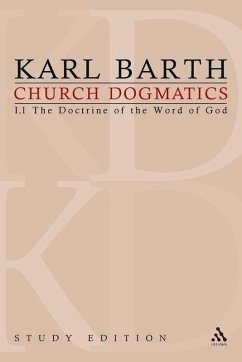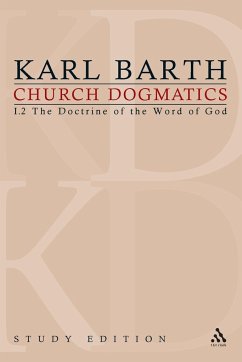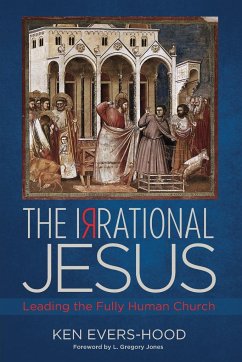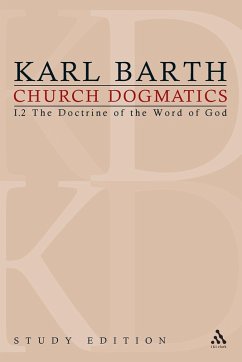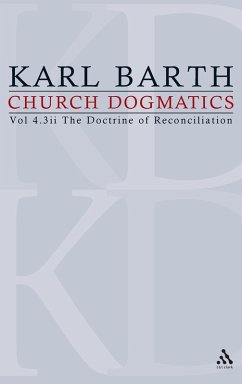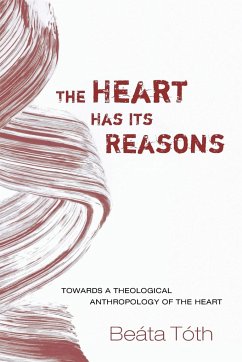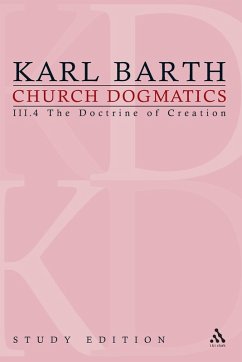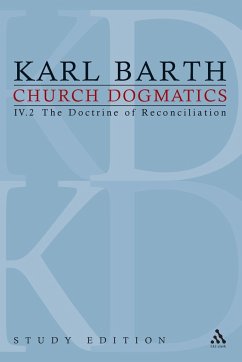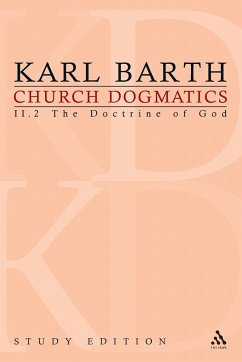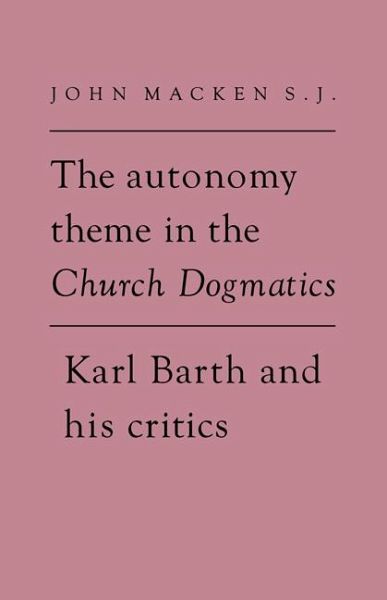
The Autonomy Theme in the Church Dogmatics
Karl Barth and His Critics

PAYBACK Punkte
52 °P sammeln!
The problem of human freedom before God echoes through the conflicts of western theology since Augustine and Pelagius and has posed an acute question to theologians for the past 200 years. Karl Barth, perhaps the greatest Protestant theologian of this century, with the directness that was characteristic of him, faced not only the question of autonomy but also the theological answers that liberals had attempted to provide to it. His dissatisfaction with their answers led him to start a theological counter-revolution, which (until recently) was thought to adopt a negative answer to the question ...
The problem of human freedom before God echoes through the conflicts of western theology since Augustine and Pelagius and has posed an acute question to theologians for the past 200 years. Karl Barth, perhaps the greatest Protestant theologian of this century, with the directness that was characteristic of him, faced not only the question of autonomy but also the theological answers that liberals had attempted to provide to it. His dissatisfaction with their answers led him to start a theological counter-revolution, which (until recently) was thought to adopt a negative answer to the question of autonomy. In this careful study Fater Macken shows that a major re-interpretation of Barth's thought in this regard took place since 1968, and that - far from being an opponent of human freedom in relation to God - Barth is now thought to have proposed a positive account of human autonomy as his theology developed. A major reappraisal has thus taken place with regard to Barth's attitude towards the modern world, and Dr Macken demonstrates that - while remaining a staunch opponent of liberal theology - Barth was neither fundamentalist nor conservative, but a creative and original thinker. This notable book, written by a Roman Catholic theologian, is the first work in English to investigate the thought of Karl Barth on the autonomy theme. Set as it is in the wider context of the modern Christian response to questions raised by the Enlightenment, it provides a comprehensive and useful guide to the 'new wave' of German Barth interpretation.The problem of human freedom before God echoes through the conflicts of western theology since Augustine and Pelagius and has posed an acute question to theologians for the past 200 years. Karl Barth, perhaps the greatest Protestant theologian of this century, with the directness that was characteristic of him, faced not only the question of autonomy but also the theological answers that liberals had attempted to provide to it. His dissatisfaction with their answers led him to start a theological counter-revolution, which (until recently) was thought to adopt a negative answer to the question of autonomy. In this careful study Fater Macken shows that a major re-interpretation of Barth's thought in this regard took place since 1968, and that - far from being an opponent of human freedom in relation to God - Barth is now thought to have proposed a positive account of human autonomy as his theology developed. A major reappraisal has thus taken place with regard to Barth's attitude towards the modern world, and Dr Macken demonstrates that - while remaining a staunch opponent of liberal theology - Barth was neither fundamentalist nor conservative, but a creative and original thinker. This notable book, written by a Roman Catholic theologian, is the first work in English to investigate the thought of Karl Barth on the autonomy theme. Set as it is in the wider context of the modern Christian response to questions raised by the Enlightenment, it provides a comprehensive and useful guide to the 'new wave' of German Barth interpretation.
Table of contents:
Preface Introduction 1. The History of the Term 'Autonomy' 2. Kant and the Term 'Autonomy' 3. Fichte: the 'Ich' as First Principle of Philosophy 4. Autonomy Opposed Theism? PART ONE: AUTONOMY IN THE CHURCH DOGMATICS OF KARL BARTH 1. The Background: Barth's Reaction Against Liberal Theology 2. Autonomy - Theonomy - Heteronomy in the Prolegomena 3. 'Autonomy' in the doctrine of Election 4. The Doctrine of Creation: against rival concepts of Autonomy 5. The Doctrine of Reconciliation: Correspondence and Distinction between God and Man 6. Nature as distrinct from Grace: the Lights of the World 7. Autonomy and Baptism: the Ethical Subject distinct from God PART TWO: THE AUTONOMY THEME IN RECENT AND CURRENT BARTH CRITICISM 1. Barth Criticism before 1968: a Negative Balance - Wolfhart Pannenberg 2. Barth's Positive Relationship to Modern Autonomy: Current Barth Criticism 3. Autonomy and Idealism in Barth 4. Autonomy and ntology: Eberhard Jungel PART THREE: CONCLUSIONS Notes Bibliography
Table of contents:
Preface Introduction 1. The History of the Term 'Autonomy' 2. Kant and the Term 'Autonomy' 3. Fichte: the 'Ich' as First Principle of Philosophy 4. Autonomy Opposed Theism? PART ONE: AUTONOMY IN THE CHURCH DOGMATICS OF KARL BARTH 1. The Background: Barth's Reaction Against Liberal Theology 2. Autonomy - Theonomy - Heteronomy in the Prolegomena 3. 'Autonomy' in the doctrine of Election 4. The Doctrine of Creation: against rival concepts of Autonomy 5. The Doctrine of Reconciliation: Correspondence and Distinction between God and Man 6. Nature as distrinct from Grace: the Lights of the World 7. Autonomy and Baptism: the Ethical Subject distinct from God PART TWO: THE AUTONOMY THEME IN RECENT AND CURRENT BARTH CRITICISM 1. Barth Criticism before 1968: a Negative Balance - Wolfhart Pannenberg 2. Barth's Positive Relationship to Modern Autonomy: Current Barth Criticism 3. Autonomy and Idealism in Barth 4. Autonomy and ntology: Eberhard Jungel PART THREE: CONCLUSIONS Notes Bibliography





